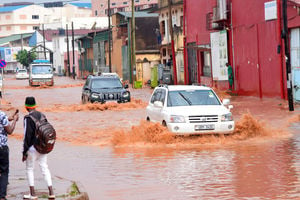
Author: Angella Nampewo. PHOTO/FILE
Recently, I came across a video of construction activity on the Karuma Bridge repair project. The video, whose source I am unable to establish, shows a lot of safety violations that should never have gone unobserved even for a day.
If there had been a qualified safety officer on site, we would never have had a worker balancing on a ledge above the raging rapids of the River Nile without a safety harness or a safety net. The construction crew would have worn hard hats or helmets. So many things were going wrong. And this is just one site. I shudder to think about what goes on beyond the prying eyes of the camera.
Just days before, an explosion at an oxygen plant in Rubaga, Kampala, resulted in two deaths. Though the cause of the blast was not yet established, an inspection of the plant revealed a sorry-looking group of youth working without personal protective equipment. Apart from the meagre pay budgeted for the lowly workers on the factory floor or the construction site, little regard is given to the safety and working conditions of employees.
While a few private companies do well, we have many safety defaulters, and the overseers are slumbering. How else would one explain the gross level of safety violations as seen in that video on a key public project like the Karuma Bridge?
We are not short of examples to illustrate this negligence. Look back at building collapses in the not-so-distant past. Illegal building extensions, a contractor probably drilling too close to a fragile wall of mud and other mishaps have left many buried in the rubble. Last year, a building collapsed in Kansanga, Kampala. The building owners were attempting an extension.
In May 2020, in Lukuli Makindye, a suburb of Kampala, a five-storey building came down, killing 13 people. According to the National Building Review Board report of September 2021, the construction site was being supervised by (and I quote) “an ‘engineer’ whose highest qualification was a certificate in bricklaying”.
Now who allowed such a grand structure to be under the supervision of an underqualified person? Your guess is as good as mine. The authorities probably had no idea or if we were to give them some credit, then we’d say someone knew but they took a bribe and allowed the travesty of construction to proceed.
I bring up both private and public installations to show that our levels of laxity are equal on either side. If public bodies are supposed to monitor the wananchi sleeping on the job, then it is everyone for himself and God for us all.
In August 2022, there was a massive flooding incident in the newly constructed Isimba Dam powerhouse, resulting in the shutdown of the dam’s four units. In the aftermath of the flooding accident said to have been occasioned by the act of an engineer opening the wrong gates, this newspaper produced a damning report on the certification status of the engineering supervision team, highlighted the absence of a national dam safety policy and want of a substantive dam safety office. Hydropower dams and other such run-of-river projects should be handled with extreme caution and seriousness, failing which, the consequences can be dire for downstream communities.
Vigilance in emergency preparedness and safety ought to be applied across the board. It is this kind of negligence and failure to heed serious warnings that resulted in the Kiteezi landfill tragedy where to date we don’t know where many of the bodies are buried.
If a government-awarded contractor is given room to play fast and loose with the safety rules astride the angry rapids of the Nile, we may never find the bodies of the victims.
Ms Nampewo is a writer and editor
[email protected]




